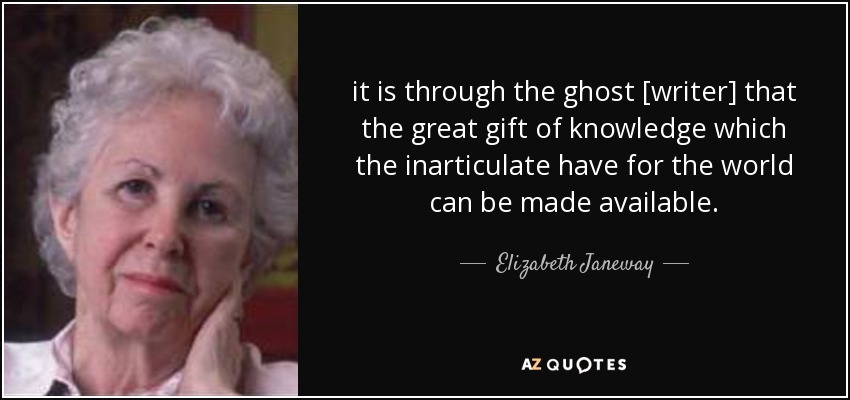A Quick Guide to Ghostwriting
In an ego-driven and cut-throat field, authoring work means getting your name out in the public space as much as possible. This can make or break your writing career, especially when getting more work means establishing a name for yourself. But this isn’t the case with ghostwriting.
If you’re a ghostwriter, your ability to establish that name is usually curtailed, as you’re writing a work that will eventually be credited to someone else. But it isn’t all black; there are some upsides.
In this article, we’ll discuss what ghostwriting is exactly, how it works, and how to make the best of it.

Image: Luke MacGregor | Credit: Reuters
What Is a Ghostwriter?
A ghostwriter is someone who is hired to write a text for someone else. In the majority of cases, the work is non-fiction (for example, a memoir); it can also be a blog and social media posts, speeches, or book proposals. However, in other instances, this can also be a fiction manuscript (although this is usually frowned upon in the publishing world).
Who Can Hire a Ghostwriter?
This approach is most frequently taken by politicians, celebrities, or high-flying executives, who might not have enough time or skill to write their own text. In such a case, this text is then credited to the client rather than to the ghostwriter.
But you don’t have to be a celebrity to hire a ghostwriter; if you have an idea that’s worth writing about or need help with drafting some written material for your business but for some reason find yourself unable to do it yourself, then hiring a ghostwriter might be a good idea.
What Are the Different Types of Ghostwriting?
There are several ways in which ghostwriters can work. Here are some of the things they can do:
- Letters from the CEO: In this instance, the text is written on behalf of a named person, for example, a CEO’s introduction letter to a report. When the text is anonymous, such as a company’s sales pitch, it isn’t ghostwriting.
- Cleaning up a rough draft: Ghostwriters don’t write from scratch. Instead, they ‘tidy up’ notes or a rough draft provided to them by the credited author. The tidied-up version is then turned into an article or book.
- Writing a complete text: The ghostwriter is given an outline or a transcript. They then write do the research and write a manuscript. The final approval and any needed changes are then given by the credited author. This is the style most frequently used in autobiographies by high-profile names, including sports stars, celebrities, and businessmen, such as Donald Trump‘s 1987 autobiography “Trump: The Art of the Deal“, ghostwritten by Tony Schwartz.
- Complete control: The ghostwriter takes complete editorial control, creating the outline and writing the book. The credited author’s sole input is to approve the text.
What Is In It for the Publishers?
Publishers use ghostwriters where there’s a potential for increased sales, particularly where a famous and marketable name is involved. It’s a tactic that can also be used where a book ties in with a major news event, such as in the lead-up to an election. In this instance, candidates will give the go-ahead for the production of an autobiography, to increase visibility and exposure.
Publishers can also establish and increase a book’s marketability by placing a celebrity name on the front cover, even if it’s been written by a ghostwriter. This is particularly used in “how-to” books, diet guides, or cookbooks.
Where a publisher has a series of books written under a pseudonym, such as the Nancy Drew and Hardy Boys mysteries, using a ghostwriter is necessary. The latter is given a template of basic information on the book’s characters, the style, and the fictional universe on which they can base their writing. It allows the publishers to establish a longer life for the books and longer-running revenues.

Is Ghostwriting a Good Idea?
On the surface, ghostwriting may seem like just another way of taking other people’s work without giving them the due recognition. But in reality, it does have several benefits, notably:
- If an expert has the knowledge but lacks the time or the writing skills, this is a great way for them to get their expertise read.
- If someone is looking to start out in writing but is worried about a steady income, ghostwriting can be a good starting point. With the high demand, they’ve got plenty of options with which to start.
- Being a ghostwriter allows you to work with interesting clients who want to write about different ideas. This in turn offers the writers great learning opportunities. For example, if a writer were to write about new media marketing, they’d learn the ropes very fast.
- The payment in ghostwriting gigs is usually upfront, as opposed to the hourly rates of some other writing careers.
- Because a ghostwriter gets to hide behind someone else’s name, they don’t need to worry about facing public criticism or worry about promoting their work. They can just get on with the writing.
- Even though ghostwriters don’t get credit for their work, there is always a good chance that the client would recommend them to others. This could be a great chance for wider exposure.
What Is the Downside of Being a Ghostwriter?
Although this may be a great way for ghostwriters just starting out, it does have its drawbacks. Aside from the lack of byline, there is also, of course, no recognition or attention given to the true author’s work.
If you’re just starting out on ghostwriting as a career path, here are a few drawbacks you might encounter:
- It is very easy to undersell your work and talent, and underestimate the amount of time and effort needed for this work. That’s why you should have the courage to negotiate a reasonable fee for the work you do—and to stick to your guns.
- Sometimes it’s tempting to take on too much work, which can mean you end up working harder for less pay.
- As ghostwriters are often freelancers, your work depends on client referrals. The more referrals you get, the more likely you are to gain work. The more the client is absorbed in their own affairs, the more likely they will be to forget to recommend you, even if you did a good job.
- You may also end up getting “stuck in a rut” because you are only focused on making money now. The solution to this is to find other work aside from that of ghostwriting that will establish your authorship. In an ego-driven age where the professional name can often mean the difference between getting the gig and not getting it, this is particularly important.
How Much Money Do Ghostwriters Make?
Whatever the ghostwriter’s scope of work, they can spend anywhere from a few months to a year working on the manuscripts. Depending on the initial agreement, ghostwriters will be paid either per word, per page, or according to total word count. They may also receive a percentage of royalties from the sales once the book is published.
The amount of money ghostwriters make varies depending on the project and how much experience they have. According to Reedsy, beginner writers can make from $2k to $9K per book. While more experienced writers, on the other hand, can make up to $70K!
For smaller projects, such as blog posts and speeches, ghostwriters can get paid per word. The rates in this case vary from 15 cents to $4. If the work is more editorial than writing–advising the author or cleaning up a rough draft– then it’d be better to get paid based on the time the ghostwriter invests in the project. And the rates vary from $35 to $140 per hour.
In the case of high-profile clients, the rate can go beyond that. Take for example the fee Hillary Clinton‘s ghostwriter received for the work completed on her autobiography, which the New York Times reported was $500,000!
How to Become a Ghostwriter
Now that you’re aware of the pros and cons of ghostwriting, and how much a ghostwriter can make per project, it’s time to learn the practical steps that will help you succeed in this profession. Here is what you have to do:
- Sharpen your skill: It goes without saying that any writer must spend time developing their skills and style. No one would want to hire a ghostwriter who doesn’t know how to turn their ideas into sensible text. So before you focus on landing your first job, take the time to improve your craft.
- Make a portfolio: Anyone looking to hire a ghostwriter would want to see their work first. That is why it’s important to get your work published. You don’t have to publish a whole book of course (although that would certainly help). Instead, you can start your own blog or submit guest posts to other blogs. Another way to show off your skills is by publishing articles on websites such as Linkedin.
- Work on your communication skills: Writing isn’t the only thing you’d want to improve as a ghostwriter. Having to work with clients, you need to know how to communicate with them effectively, as most ghostwriting jobs require many interviews with the credited author in order to be able to deliver what they have in mind. You would also need to learn how to recognize the client’s voice (and any catchphrases they repeatedly use) to implement in the writing so that it’d appear more authentic.
- Build a professional network: Personal and professional connections do wonders in any freelancing career, and that’s true for ghostwriting. So make as many connections as you can in the publishing industry, and get the word out there that you’re accepting new ghostwriting projects. And after you finish your first ghostwriting job, ask the credited author to recommend you to their connections.
How Does the Ghostwriting Process Go?
You have been hired for your first ghostwriting job? Congrats! Here’s what you have to do:
- Interview the credited author to understand their voice (the way they talk and write) and the details of the job. This can be done in person, or via phone or video conference.
- If it is a book, you’ll need to send a project proposal, explaining how are you going to go about this project.
- Once the proposal is approved, the research process starts. This includes interviewing the author and their connections for more details, and making use of video footage or already published articles on the subject
- When you’ve all the material you need, you should start writing the first draft while trying to reflect the character and style of the credited author. Note the drafting process takes time; you don’t want to rush the process and present anything to the credited author that might affect your credibility.
- The credited author may now choose to ask for some edits or change parts of the text. Note that not all clients get muchly involved, which means that some will ask for thousands of edits while others may ask for the bare minimum.
- Now that you’ve applied all the required edits and the final draft is ready, it is time for this project to get published.
Final Thoughts
With digital publishing accounting for approximately 15%-20% of the international book market in 2015, newer and more varied opportunities have opened up for ghostwriters. This is particularly seen with short books and novellas, as seen in the Amazon Kindle Singles publications (which are up to 30,000 words in length).
As it’s shorter in length and more affordable for the client and publisher, this form of ghostwriting has quickly gained popularity. It has also given ghostwriters greater work opportunities.
.
Read More
The Basic Guide to Self-Publishing Books
Why and How to Convert Your Book to an Audiobook
How to create an interactive ebook: A step-by-step guide

















Dan Treccia
February 7, 2017You forgot “Stronger Together” the Amazon bestseller 😉
Kotobee
February 8, 2017Great addition! Do you know whose the ghostwriter behind it?